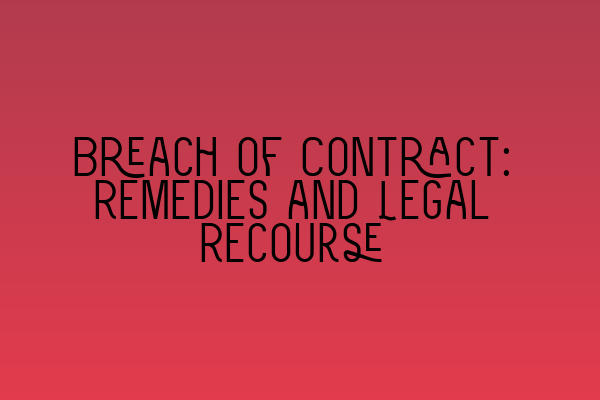Breach of Contract: Remedies and Legal Recourse
When entering into a contract, both parties have certain obligations and expectations. However, there are instances where one party fails to fulfill their duties, resulting in a breach of contract. In such situations, it is crucial to understand the available remedies and legal recourse to protect your rights and seek appropriate compensation.
Before discussing the remedies, let’s first define what constitutes a breach of contract. A breach of contract occurs when one party fails to perform their obligations as outlined in the contract. This can include failure to deliver goods or services, non-payment, missed deadlines, or any other violation of the agreed-upon terms.
Types of Remedies
When a breach of contract occurs, there are several remedies available to the injured party. The type of remedy sought depends on the nature and extent of the breach. Here are the most common remedies:
1. Damages
Damages are the most common remedy sought in breach of contract cases. The purpose of damages is to compensate the injured party for any losses suffered as a result of the breach. There are two main types of damages:
a) Compensatory Damages: These are monetary awards intended to compensate the injured party for actual losses incurred. Compensatory damages aim to put the injured party in the same position they would have been in had the contract been fulfilled. They can include direct financial losses, such as lost profits, as well as indirect losses, such as reputational damage.
b) Consequential Damages: Consequential damages refer to losses that occur as a consequence of the breach but are not directly caused by it. These damages are often harder to prove and may require expert testimony or extensive evidence.
It is important to note that the injured party has a duty to mitigate their damages, meaning they must take reasonable steps to minimize their losses.
2. Specific Performance
In certain situations, damages may not be an adequate remedy, especially when dealing with unique goods or services. In such cases, the injured party can seek specific performance, which is a court order requiring the breaching party to fulfill their obligations as outlined in the contract. Specific performance is typically sought when the subject matter of the contract is rare or irreplaceable, such as artwork or custom-made items.
3. Rescission
Rescission is another remedy available for breach of contract cases. It involves canceling the contract and restoring the parties to their pre-contract positions. Rescission is often sought when the breach is substantial or when one party has been fraudulently induced into entering the contract. It essentially renders the contract void from the beginning, releasing both parties from their obligations.
4. Injunction
In certain circumstances, a party can seek an injunction to prevent the breaching party from continuing their wrongful actions. An injunction is a court order that prohibits certain behaviors or requires specific actions to be taken. In breach of contract cases, an injunction may be necessary to prevent irreparable harm or to enforce the terms of the contract.
Legal Recourse
When faced with a breach of contract, it is important to seek legal advice to fully understand your options for legal recourse. Consulting with a solicitor who specializes in contract law can help you navigate the complexities of the legal system and ensure your rights are protected.
If you require professional legal assistance or would like to learn more about contract law and legal practice, SQE Contract Law is here to help. Our team of experienced solicitors is dedicated to providing expert guidance and representation in various areas of law, including contract disputes.
For further insights into legal practice and decision-making, check out our article on Unveiling Real-Life Case Studies: Insights into Legal Practice and Decision-Making. This article delves into real-life case studies, providing valuable insights for legal professionals and individuals seeking a better understanding of the legal process.
Additionally, if you are curious about solicitor salaries in the UK and the factors that affect income, our article on Exploring Solicitor Salaries in the UK: Average Earnings and Factors Affecting Income is a must-read. It sheds light on various factors that can impact solicitors’ earnings, allowing you to make informed decisions about your legal career.
Mastering client relationship management skills is essential for solicitors to enhance trust and loyalty. To gain valuable insights and tips on this topic, we recommend reading our article on Mastering Client Relationship Management: Skills for Solicitors to Enhance Trust and Loyalty.
If you are considering pursuing a law school education in the UK and want to choose the right path for your future, our article on Pursuing a Law School Education in the UK: Choosing the Right Path for Your Future provides valuable information and guidance. It covers various educational options available to aspiring lawyers, helping you make an informed decision.
Finally, if you are looking for guidance on securing training contracts and navigating the journey to becoming a solicitor, our article on Securing Training Contracts: A Roadmap to Becoming a Solicitor offers a comprehensive roadmap to help you achieve your career goals.
Remember, when it comes to breaches of contract, understanding your rights and pursuing the appropriate remedies is crucial. Seeking legal advice and taking appropriate legal action can help protect your interests and ensure fair compensation.
Disclaimer: The information provided in this article is for general informational purposes only and should not be construed as legal advice. For accurate legal advice tailored to your specific situation, consult with a qualified solicitor.
